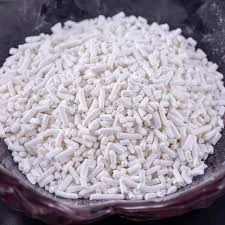
Exploring the Properties and Applications of E471 Emulsifier in Food Science
Understanding E471 Emulsifier Applications and Safety
In the expansive world of food additives, E471, commonly known as glycerol esters of fatty acids, has carved a substantial niche due to its versatile emulsifying, stabilizing, and thickening properties. This article aims to delve into the significance, applications, and safety of E471 in the food industry.
What is E471?
E471 is an emulsifier derived from glycerol and fatty acids, which can be sourced from both animal and plant fats. By allowing water and oil to mix, E471 plays a crucial role in ensuring that ingredients maintain consistency, preventing separation and enhancing texture. Its versatile nature makes it a valuable addition in various food products.
Key Applications
E471 serves multiple functions across a wide array of food products. Here are some of its primary applications
1. Baked Goods In the realm of bread and pastries, E471 helps achieve a uniform dough consistency and enhances volume. This ensures that products are light, airy, and possess the desired texture.
2. Margarine and Spreads E471 is prevalent in margarine and other spreads, where it acts as an emulsifier to blend water and oils, ensuring a smooth and creamy product. It aids in maintaining consistency over varying temperatures.
3. Ice Cream This emulsifier is key in ice cream production, preventing the formation of ice crystals and improving mouthfeel. By stabilizing the fat structure, E471 contributes to a creamier texture that enhances the overall eating experience.
4. Sauces and Dressings E471 is commonly found in salad dressings and sauces where it helps keep oil and vinegar blended, improving the overall texture and flavor distribution.
e 471 emulsifier

5. Chocolate and Confectionery In the chocolate industry, E471 serves as a vital ingredient, facilitating the smooth mixing of cocoa solids and fats, resulting in a glossy finish and improved mouthfeel.
6. Processed Foods From ready meals to snack foods, E471 is utilized for its stabilizing properties, ensuring that products maintain their intended texture and quality throughout their shelf life.
Health and Safety Considerations
The safety of food additives is a critical concern for consumers, and E471 has been subject to extensive research over the years. Regulatory bodies, including the European Food Safety Authority (EFSA) and the Food and Drug Administration (FDA) in the United States, have conducted thorough assessments to evaluate its safety.
1. Acceptable Daily Intake (ADI) Studies indicate that E471 has a high acceptable daily intake limit, suggesting that it can be consumed in large quantities without adverse effects. Most individuals consume it well below the established safety thresholds.
2. Potential Allergens As E471 can be derived from both plant and animal sources, it may pose a risk for individuals with specific allergies or dietary restrictions. Those adhering to a strict vegan or vegetarian diet may prefer to check product labels to ensure they avoid animal-derived emulsifiers.
3. Consumer Concerns A growing trend towards natural and organic products has led to increased scrutiny over synthetic additives, including E471. While it is generally recognized as safe, manufacturers are increasingly seeking alternative emulsifiers from natural sources to cater to consumer preferences.
4. Environmental Impact The source of E471 can also have environmental implications, depending on whether it is derived from sustainable practices. Awareness surrounding sustainable sourcing continues to rise, prompting consumers to consider the ecological footprint of their food choices.
Conclusion
E471 is a pivotal emulsifier in the food industry, contributing not only to the sensory attributes of various products but also enhancing their stability and shelf life. As with many food additives, it is essential for consumers to be informed about what they are consuming and make choices that align with their health and ethical standards. The ongoing evolution in consumers’ preferences for cleaner labels and environmentally conscious ingredients may shape the future utilization of E471 and similar emulsifiers. Understanding the roles and implications of such food additives is crucial for informed dietary decisions in today’s diverse food landscape.
-
Aluminum Hydroxide: Quality Gels & Dried Gel AntacidNewsAug.31,2025
-
Buy High-Quality Trichloroisocyanuric Acid for Sale | TCCA 90% SupplierNewsAug.30,2025
-
Pure Sodium Dichloroisocyanurate Dihydrate | Powerful DisinfectantNewsAug.29,2025
-
Industrial Chemicals: Quality & Purity for Every IndustryNewsAug.28,2025
-
Nitrile Rubber Honoring Strict Production StandardsNewsAug.22,2025
-
Aspartame Ingredients Honoring Food Safety ValuesNewsAug.22,2025
-
Fertilizer for Balanced Plant NutritionNewsAug.22,2025
Hebei Tenger Chemical Technology Co., Ltd. focuses on the chemical industry and is committed to the export service of chemical raw materials.
-

view more DiethanolisopropanolamineIn the ever-growing field of chemical solutions, diethanolisopropanolamine (DEIPA) stands out as a versatile and important compound. Due to its unique chemical structure and properties, DEIPA is of interest to various industries including construction, personal care, and agriculture. -

view more TriisopropanolamineTriisopropanolamine (TIPA) alkanol amine substance, is a kind of alcohol amine compound with amino and alcohol hydroxyl, and because of its molecules contains both amino and hydroxyl. -

view more Tetramethyl Thiuram DisulfideTetramethyl thiuram disulfide, also known as TMTD, is a white to light-yellow powder with a distinct sulfur-like odor. It is soluble in organic solvents such as benzene, acetone, and ethyl acetate, making it highly versatile for use in different formulations. TMTD is known for its excellent vulcanization acceleration properties, which makes it a key ingredient in the production of rubber products. Additionally, it acts as an effective fungicide and bactericide, making it valuable in agricultural applications. Its high purity and stability ensure consistent performance, making it a preferred choice for manufacturers across various industries.





